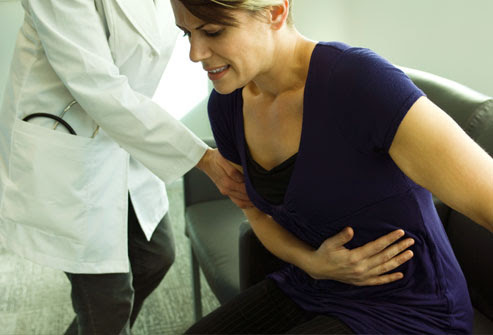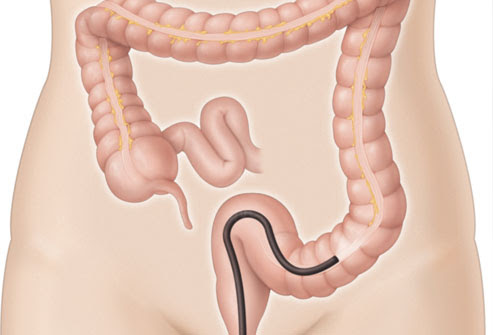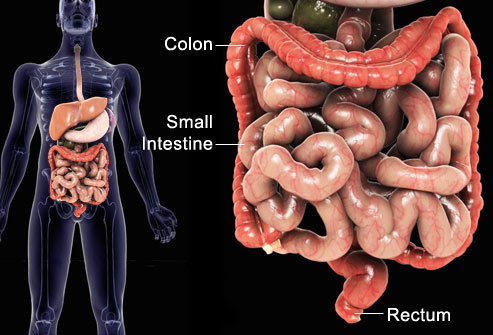Crohn disease

INTRODUCTION
Crohn disease is a condition that affects the digestive tract. The cause of Crohn disease is unknown. The most common symptoms of Crohn disease include diarrhea, abdominal pain, weight loss, and fever. Some people with Crohn disease also have problems outside of the digestive tract, including a skin rash, joint pain, eye redness, and, less commonly, liver problems.
There is no cure for Crohn disease, but there are medicines that can help to keep the disease under control. If medicine does not control symptoms, surgery might be an option to remove the diseased part of the colon.
This article discusses the symptoms and treatment of Crohn disease.
WHAT IS CROHN DISEASE?
Crohn disease is an autoimmune disease, but the precise cause is not known. Having family members with Crohn disease probably increases the risk of developing the condition. When a person with this inherited risk is exposed to a trigger (an illness or something in the environment), the immune system is activated.
In people with Crohn disease, the immune system recognizes the lining of the digestive tract as foreign and attacks it, causing inflammation. This inflammation causes the lining of the digestive tract to develop ulcers and bleed. Crohn disease usually affects the colon and the last portion of the small intestine called the "ileum," but it can affect the entire digestive tract, from the mouth to the anus.
Crohn disease, like ulcerative colitis, is an inflammatory bowel disease (IBD). Inflammatory bowel disease should not be confused with irritable bowel syndrome (IBS). (See "Ulcerative colitis" and "Irritable bowel syndrome".)
Will I get better? — Crohn disease usually follows a pattern of:
●Flares (when the condition worsens)
●Remissions (when it improves)
About 10 to 20 percent of people will have a remission after their first flare of Crohn disease. The pattern can be variable, with repeated bouts (weeks to months) of symptoms, such as mild diarrhea and cramping. Less commonly, there can be severe and disabling symptoms (such as severe abdominal pain and a blockage in the bowels). Lifelong treatment is needed for people with Crohn disease, and treatment increases the chance of entering and staying in remission.
CROHN DISEASE SYMPTOMS
The most common symptoms of Crohn disease include abdominal pain, diarrhea, fatigue, and weight loss. Other symptoms can include mouth sores, skin problems, eye inflammation, and anal problems, such as fistulas and abscesses.
 ●Mouth sores – (called aphthous stomatitis) can develop during flares of Crohn disease. They are usually found between the gums and lower lip, or along the sides or underside of the tongue (picture 1). Mouth sores are often painful. The medicines used to treat the digestive tract usually help to treat mouth sores.
●Mouth sores – (called aphthous stomatitis) can develop during flares of Crohn disease. They are usually found between the gums and lower lip, or along the sides or underside of the tongue (picture 1). Mouth sores are often painful. The medicines used to treat the digestive tract usually help to treat mouth sores.
●Eye inflammation – Inflammation of the eyes (called uveitis or scleritis) occurs in up to 5 percent of people with Crohn disease. These problems can affect one or both eyes. Symptoms of uveitis include "floaters" in the vision, eye pain, blurred vision, and sensitivity to light. Scleritis can cause burning or itching of the affected eye. Treatment usually includes eye drops. (See "Skin and eye manifestations of inflammatory bowel disease".)
●Anal problems – Crohn disease can cause problems in the area around the anus. The most common problems include fissures (tears), ulcers, fistulas (a tunnel between the intestine and other organs), infected areas of skin, and stenosis (narrowing of the anus). These problems may occur alone or in combination.
Anal problems sometimes heal on their own without treatment. In other cases, treatment with medicines or surgery will be required. Soaking your bottom in warm water a few times a day and gently cleaning the area can help to speed healing.
CROHN DISEASE MEDICATIONS
There are a number of medicines used to treat Crohn disease. The "best" medicine depends upon which part of the digestive tract is causing symptoms. The following is a summary of commonly used medications.
5-aminosalicylates — The 5-aminosalicylates (abbreviated 5-ASA) are a group of medicines that reduce inflammation in the digestive tract. 5-ASA medicines are usually used first to treat a flare and may be recommended continuously to prevent new flares. Mesalamine is the most commonly used 5-ASA and comes in several different formulations as capsules or tablets.
Antibiotics — If 5-ASA medicines do not control your symptoms, your healthcare provider may recommend a course of antibiotics. Antibiotics can reduce the number of bacteria in the intestines, which may help to reduce inflammation. (See "Antibiotics for treatment of inflammatory bowel diseases".)
Steroids — A type of medicine called steroids (such as prednisone and budesonide) may be recommended if you do not respond to 5-ASAs or antibiotics, or if you have severe symptoms. Steroids are usually used for a limited time to get the inflammation under control, and are then slowly stopped. Steroids are not usually recommended long-term because of the risk of side effects.
Immunomodulators — Immunomodulators help to reduce the inflammation associated with Crohn disease. Immunomodulators might be recommended if you have severe symptoms or do not improve with steroids, or if your symptoms worsen after decreasing your steroid dose. The most commonly used immunomodulators include azathioprine, 6-mercaptopurine, and methotrexate. (See "Immunomodulator therapy in Crohn disease".)
Biologic response modifiers — Biologic response modifiers are a class of medicines that work by preventing inflammation. These medicines are often used in combination with treatments described above.
Biologic response modifiers are costly and can have serious side effects (see 'Side effects' below). As a result, biologic response modifiers are generally reserved for people with severe symptoms who have not responded to other treatments.
Biologic response modifiers are given either as an injection or through the vein; some can be given at home, while others must be given in a doctor's office.
The most commonly used biologic response modifiers include:
 ●Infliximab – Infliximab (Remicade)
●Infliximab – Infliximab (Remicade)
●Adalimumab – Adalimumab (Humira)
●Certolizumab pegol – Certolizumab pegol (Cimzia)
Side effects — Biologic response modifiers interfere with the immune system's ability to fight infection and should not be used in people with serious infections. Testing for tuberculosis (TB) is needed before starting treatment since treatment can "activate" TB if you have been exposed to TB previously.
Biologic response modifiers are not recommended for people who currently have or have previously had lymphoma (a type of cancer). Some studies have reported an association between these drugs and a higher risk of developing lymphoma. More research is needed in this area.
SURGERY FOR CROHN DISEASE
Medicines can help control the symptoms and complications of Crohn disease and can help you to avoid or postpone surgery. However, surgery may be recommended if your symptoms are not controlled with medicine or if the side effects of medicine are unbearable. About 80 percent of people with Crohn disease will need surgery at some point in their life.
It is important to have realistic expectations of surgery. Surgery does not cure Crohn disease, but it can help you to feel better and return to normal activities. The disease eventually returns after surgery, and most people will need to keep taking medicines to control symptoms over the long term. However, between 85 and 90 percent of people have no symptoms during the year following surgery. Up to 20 percent of people have no symptoms 15 years after surgery.
The most commonly performed surgeries for Crohn disease include:
●Removal of part of the colon – For this procedure, the surgeon removes the diseased part of the intestine (called a resection), then rejoins the two ends (called an anastomosis). After surgery, most people are still able to have bowel movements as usual, through the anus.
In some cases, the surgeon will not be able to reconnect the two ends of the intestine. Instead, he or she will connect the intestines to an opening in the abdomen, called an ostomy. Bodily waste will exit your body through the ostomy, rather than through your anus. You will wear a plastic bag on the outside of the ostomy to collect the waste, and you will empty the bag as needed.
In most cases, the ostomy is temporary and is reversed after your colon has healed for a few months. In other cases, a permanent ostomy is required.
The idea of an ostomy can be frightening. You will need to learn how to care for the ostomy, including how to care for the skin around the ostomy and fitting and emptying the bag that covers the ostomy. An ostomy nurse specialist is expert in the care of people with ostomies. With training, time, and support, it is possible to lead a normal life with an ostomy.
●Opening blockages – Strictureplasty is a procedure used to open blockages (strictures) in the bowel. It is sometimes done at the same time as a resection. Strictureplasty may be recommended if you have blockages in a particular part of your bowels over and over.
CROHN DISEASE AND LIFESTYLE
There might be certain foods or food groups that worsen your symptoms, particularly during flares, and it is reasonable to avoid these foods temporarily. However, eliminating entire food groups can lead to malnutrition. Talk to your healthcare provider or a dietitian for help in managing your diet.
Other lifestyle recommendations include the following:
●Regular exercise is a good idea for everyone, including people with Crohn disease
●Smoking can worsen Crohn disease and increases the risk of needing surgery. People with Crohn disease should not smoke.
●Avoid taking nonsteroidal antiinflammatory drugs (such as ibuprofen [sold as Motrin and Advil] and naprosyn [sold as Aleve]) since they can worsen the disease.
Crohn disease and colon cancer — Having Crohn disease increases your risk of developing colorectal cancer. Your risk depends on how long you have had Crohn disease and how much of your colon is affected.
To find colorectal cancer as soon as possible, most experts recommend that people with Crohn disease start having colon cancer screening early and often. For some people, this might mean having a colonoscopy eight years after being diagnosed, and then once per year thereafter. (See "Colonoscopy".)
Talk to your healthcare provider to find out when you should start having colon cancer screening and how often it should be repeated.
CLINICAL TRIALS
New medicines are continually being developed to treat Crohn disease. The majority of the new medicines that are being developed help control inflammation. Many of these drugs are currently undergoing clinical trials. As of yet, none have been proven to be better than currently available treatments.
![]() Ju lutem kini parasysh që ky informacion jepet si shtesë e këshillave të kujdesit nga mjeku juaj. Ky informacion nuk ka për qëllim dhe nuk nënkupton të shërbejë si zëvendësim i këshillave mjekësore profesionale. Telefononi menjëherë ofruesin e kujdesit shëndetësor nëse mendoni se keni urgjencë mjekësore! Kërkoni gjithmonë këshillat e mjekut tuaj ose të ndonjë ofruesi tjetër të kujdesit shëndetësor të kualifikuar përpara se të filloni një trajtim të ri apo nëse keni pyetje lidhur me ndonjë gjendje mjekësore!
Ju lutem kini parasysh që ky informacion jepet si shtesë e këshillave të kujdesit nga mjeku juaj. Ky informacion nuk ka për qëllim dhe nuk nënkupton të shërbejë si zëvendësim i këshillave mjekësore profesionale. Telefononi menjëherë ofruesin e kujdesit shëndetësor nëse mendoni se keni urgjencë mjekësore! Kërkoni gjithmonë këshillat e mjekut tuaj ose të ndonjë ofruesi tjetër të kujdesit shëndetësor të kualifikuar përpara se të filloni një trajtim të ri apo nëse keni pyetje lidhur me ndonjë gjendje mjekësore!

